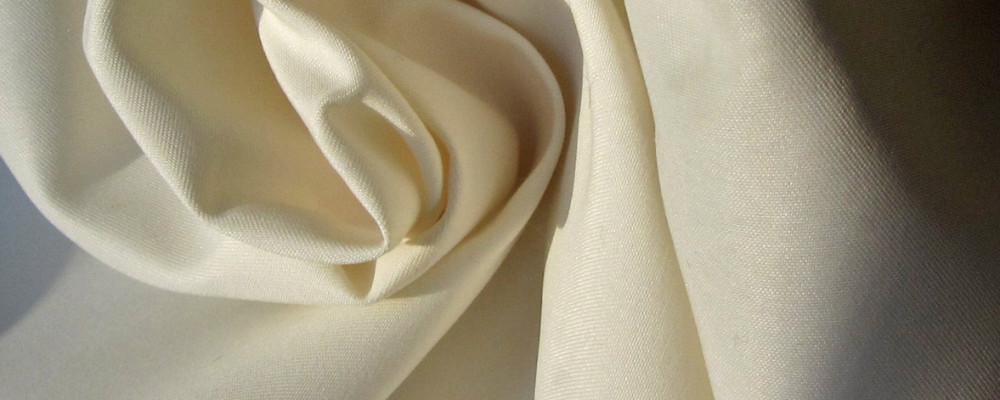
What's The Deal With Recycled Polyester?
Do you normally frown and turn away when you come across “polyester” on a garment label? You aren't alone! Thousands of others, including me, share your dislike for virgin polyester, which is an energy-hungry, non-sustainable synthetic fibre. But that distain doesn't stop it being one of the two (along with cotton) most produced fabrics in the world! Now, would you believe me if I told you that not all polyester is bad?
There is, in fact, a “green” version of this textile – Recycled Polyester, which has the term “polyester” in its name, but is nothing like the polyester we all know about. Join me as I explore what this fabric is, how it is made and the latest developments in manufacturing and use, over the course of this article.
A Green, Sustainable Alternative to Virgin Polyester
Now, would you believe me if I told you that not all polyester is bad? #recycled #ecofabric

What is Polyester?
Polyester is a manmade fibre, synthesized from petrochemical products such as ethylene glycol and dimethyl terephthalate, by a process called polymerization. This is a complex process, but if you're interested, you can find out more here. Although this fibre is wrinkle-resistant, easy to clean and dries quickly, it is notorious for a number of reasons:
The first of these is that the fabric is not environment-friendly. Production of the fabric involves huge quantities of water, chemicals and use of fossil fuels. The raw materials and by-products are toxic, pollute water and air and cause several health issues.
Apart from the environmental factor, the non-biodegradable fabric has an artificial shine and feel - it's not generally a nice fabric to touch, to look at and particularly to wear. It doesn't breathe like cotton or other natural fibres, which makes the experience of wearing polyester hot and sweaty - not what I want to wear at all! Is any one else picturing Classic 70's Polyester Shirts?!
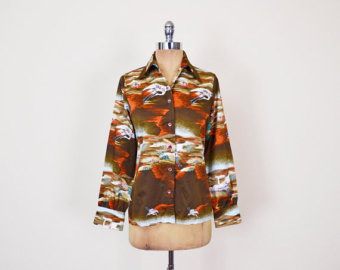
>> Register, and upgrade as a Professional Member of The Sustainable Fashion Collection for full access to our archive of Masterclasses on ethical fabrics and sustainable fibres. <<
Recycled Polyester – How is it different?
Unlike polyester, recycled polyester uses PET as the raw material. This is the same material that is used in clear plastic water bottles, and recycling it to create the fabric prevents it from going to landfill. The steps involved in the production process are as follows.
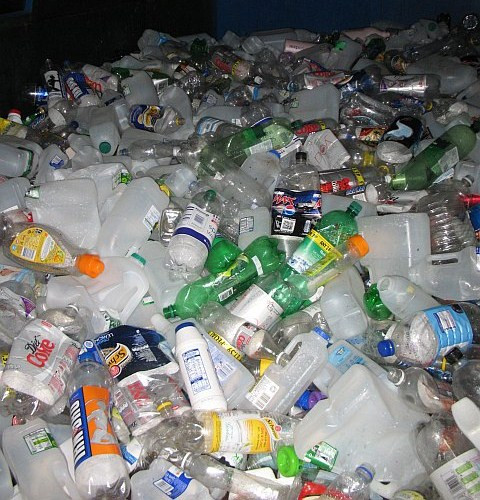
- The collected PET bottles are sterilized, dried and crushed into small chips.
- The chips are heated and passed through a spinneret to form strings of yarn.
- This yard is wound up in spools.
- The fibre is then passed through a crimping machine to create a fluffy wooly texture.
- This yarn is then baled, dyed and knitted into polyester fabric.
We can see how the products at the various steps of repolymerization of PET look, in this image.
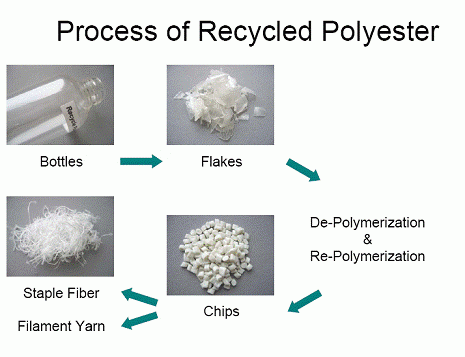
How Ethical Is It Versus Virgin Polyester?
This process of converting PET into recycled polyester requires much less energy than in the case of normal polyester. In fact it takes 33-53% less energy. Isn't that a huge difference? There are two main advantages to this process:
- Using more recycled polyester reduces our dependence on petroleum as the raw material for our fabric needs.
- Diverting PET bottles for this process reduces landfill, and thus less soil contamination, air and water pollution.
Another benefit is that the garments created from recycled polyester can be recycled again and again with no degregation of quality, allowing us to minimize wastage. This means garment manufacture could potentionally become a closed loop system, polyester could forever be reused and recycled! Something you cannot say for a lot of other fibres. The non-biodegradbility of polyester could actually be a good thing, not bad!
How Ethical Is Recycled Polyester Versus Natural Fibres?
If we were to compare this fibre against natural fibres like cotton, it may still be plastic, but it still has its advantages.
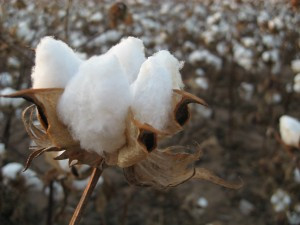
We all love cotton, but unless it is organic cotton, we cannot forget the environmental impact of pesticides, chemicals and fertilizers that go into manufacturing the crop. Recycled polyester doesn't require agricultural land, nor does it consume gallons of water like cotton does. Compare it with silk, and you have to agree that no living creatures are harmed during its manufacture, making it a more ethical option. Both these fabrics also only have a limited life span; they cannot be reused in the same way as polyester and even though they do eventually breakdown they can still take years and years and decompose.
>> Register, and upgrade as a Professional Member of The Sustainable Fashion Collection for full access to our archive of Masterclasses on ethical fabrics and sustainable fibres. <<
Technological Advances that Make Recycled Polyester More Attractive
With nearly 653,740 tons of clothes sent to landfill every year, wouldn't you agree that recycling textiles is becoming increasingly necessary? Textile recycling technology has immense scope where polyester is concerned. Closed loop manufacturing processes are being adopted by more and more manufacturers today, who refine old polyester into new raw material for garments. This technology has nominal waste, consumes limited energy and causes very little pollution. In short, it is environment-friendly.
It can also be a really quality fabric, breathable, lightweight, hardwearing. The vision we have of 'bad quality' polyester is a very outdated one.
Patagonia has made significant strides in this area. Having started the practice of recycling plastic bottles into their products in 1993, they were the first outdoor clothing manufacturer to have adopted recycled polyester in their garments. They have also offered take back schemes for years for when your garment wears out. They encourage long life use of clothing even running marketing campaigns telling their customers not to buy items! (Unless they really needed them).
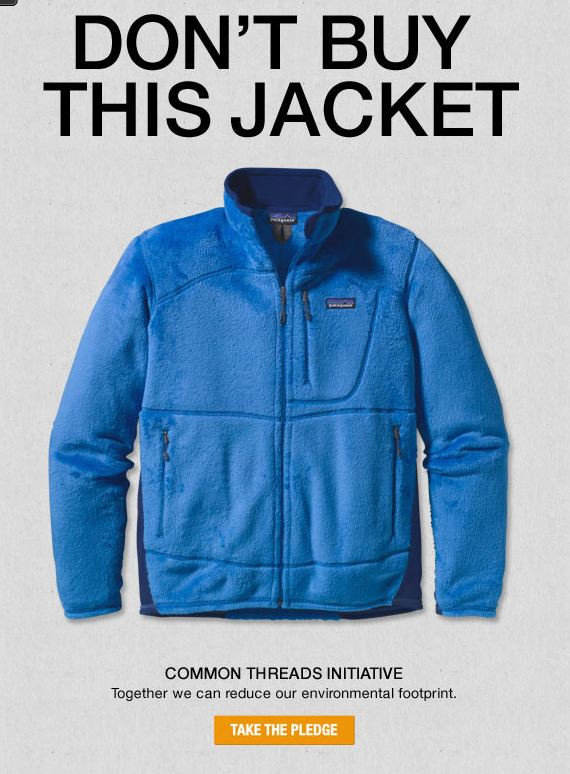
@patagonia were the first outdoor clothing manufacturer to adopt recycled polyester #recycled #ecofabric

Another notable name is Riz Boardshorts. This organization creates all their products from 100% recyclable fabrics. They strongly urge users to return old unwanted surf shorts, so they can recycle and reuse it, offering discount on their next pair.
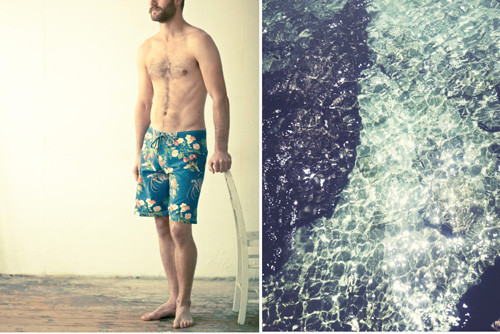
In my opinion, however, it is Kate Goldsworthy, who deserves special mention, for her work on recycled polyester. Working with Worn Again and amazing zero waste designer David Telfer she is developing a blue print for a Zero Waste Dress, which is a polyester garment that can be recycled to the highest quality. Read more about the project here.
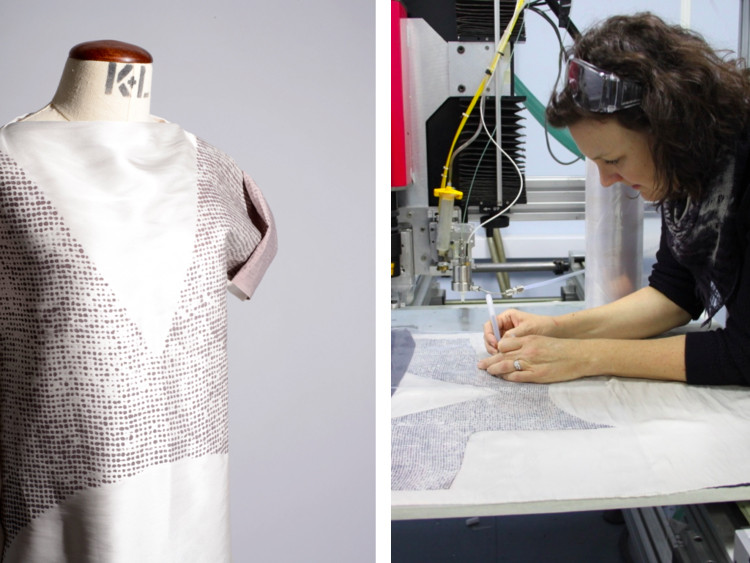
The materials used in this experiment were constructed using the mono finishing technique, where Goldsworthy used laser to create surface finishes in place of traditional methods. The use of laser means there are no glues, chemicals, stitching or pastes in the material. As a result, they can be recycled into high quality fibres that are comparable to virgin quality polyester. With this pioneering step, we can soon hope to see 100% recyclable, and thus sustainable fabric that will serve us well in the years to come.
Thus, we come to the end of this fascinating story of Recycled Polyester. I hope your impression of this fabric has now changed and you will reconsider your take on all that is “polyester” as you welcome this great product into your wardrobe. I hope you're as excited as me about what the future holds for recycled polyester!
If you're still not sure about it why not order yourself a sample of our brand new recycled polyester from the shop today to see for yourself! Click here for more details.
If you'd like to read more of these articles, then please do sign up to our monthly newsletter, where I round up all the latest posts. And I’d really love if you’d share the article using the “click to tweet” buttons throughout the article and below!
The non-biodegradbility of polyester could actually be a good thing, not bad! #recycled polyester #eco friendly

rPet doesn't require agricultural land, or consume gallons of water like cotton. #recycled polyester #cotton

Interested in learning more about ethical textiles and how to use them in your fashion collection?
The Sustainable Fashion Collective brings you Masterclasses on specific fibre types. Each Masterclass contains lessons from guest experts, from brands to material innovators.
Recycled Fabrics: The Social, Environmental and Economic Impact
Ethical Fabrics And Why We Need To Use Them
The Environmental Impacts Of Washing And Laundry
Extending The Life Of Clothing And Textiles
Upcycling And The Circular Economy
